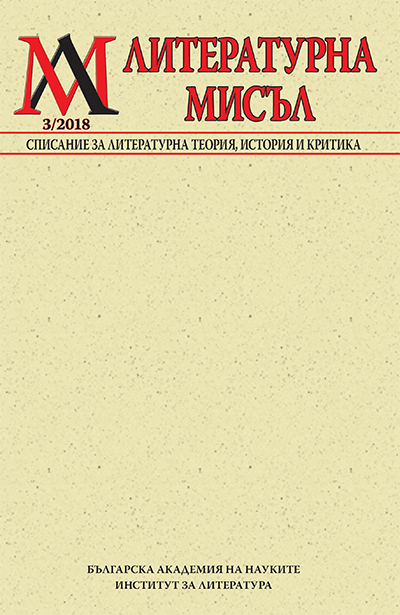
Дина Йорданова
Артистичната личност и балканското кино: Подозрение и отчуждение
Dina Iordanova
The Artist in Balkan Cinema: Suspect аnd Insufficiently Balkan
-
Summary
As represented in Balkan cinema – and here we mainly look at cinematic texts created in the context of former Yugoslavia’s constituent republics -- the artist is suspect. The presence of the artist is awkwardly tolerated – because the artist is alien, cosmopolitan, and extraneous. He may react in unpredictable ways or have eccentric wishes. The artist may seek fame but no fame can come. The artist is insufficiently Balkan. He is better off being abroad. Even where films put the artist in the centre of attention, there is indolent insufficiency in representing the artist. In this playful exploration, we look at various cinematic texts that have provided commentary on the status of the artist in a Balkan context. The concept of ‘Balkan’ used here is not a geographical category but rather complies with the definition given in my book Cinema of Flames (2001) as well as, occasionally, is used in the sense implied by Marina Abramovic in her short Balkan Erotic Epic (2011).
Keywords: Balkan cinema, artist, suspicion, former Yugoslavia
Андрей Степанов
За интересното литературознание
Andrei Stepanov
On Interesting Literary Studies
-
Summary
The author argues that modern literary studies and university teaching of literary subjects are tending towards so-called “interesting topics”, which are similar to the popular idea of “interesting men”, who are interested in women, wine and playing cards (respectively, gender and sexual issues, altered states of mind, contingencies).The author argues that modern literary studies and university teaching of literary subjects are tending towards so-called “interesting topics”, which are similar to the popular idea of “interesting men”, who are interested in women, wine and playing cards (respectively, gender and sexual issues, altered states of mind, contingencies).
Keywords: contemporary literary studies; popularization; problems of verifiability/ falsifiability
Цветана Георгиева
Eвропейската война през погледа на левите експресионисти у нас (Гео Милев – Ламар)
Tsvetana Georgieva
The WWI in through the eyes of the left expressionists in Bulgaria (Geo Milev – Lamar)
-
Summary
The Left expressionism in Germany before and during WWI is one of the most powerful aesthetic movements that reflect the problems of war and post-war generation. In Bulgaria, a supporter of such a leftist social view – Geo Milev, propagandist of expressionism in his text he himself involved in the war. His successor is Lamar, who in the journal "NOVIS" memory war became a part of the world view of his contemporaries, as published in the Journal of poems, short stories, and criticism, essays, translations, illustrations and images that capture wartime.
Keywords: WWІ, Left expressionism, post-war generation, Geo Milev, Lamar
Мая Горчева
Отровата на искреността: Мотивът за двойника в романа „Безразличният“ на Цветан Марангозов между литературна реконструкция, биографично свидетелство и разсекретени досиета
Maya Gorcheva
The truth potion: The Motive of the Double-life in the Novel “The Indifferent” by Tsvetan Marangozov between the Literary Reconstruction, Biographic Evidence and Unclassified Files
-
Summary
The theme of a double life, characteristic of the writing of Bulgarian emigrants, has gained a hypertextual and especially existential meaning after the disclosure of the writer as an agent of the services. He is simultaneously a witness and a discloser in his works: the ordeals of signing the declaration of secrecy are retold in both editions of the novel “The Indifferent”; it spurs to the ruthless self-disclosure in the dramas “The Mushroom” and “The Smile of Fear”. The research traces the relationship between the textual evidence in both editions of the novel as well as the memory of the double existence of the author in order to outline the significance of literary evidence as the most truthful memory of the “cluelessness” of time.
Keywords: Zvetan Marangozov, unclassified files of Bulgarian writers, “The Indifferent”, “The Mushroom”, “The Smile of Fear”
Дияна Николова
Екзотична еротика – европейското чуждо като другото свое
Diyana Nikolova
Exotic eroticism: the European other as the other self
-
Summary
The paper discusses the construction of the concept of the oriental woman (the exotic “other” woman) in West European paintings and literature. It analyses the ways and means through which “Eastern erotica” develops into a cultural mythologem as well as the reasons why the erotic is increasingly used in the construction of the concept of the exotic in West European art in the 18th and 19th century. What is also given thought and careful consideration is the specificity of the Romantic notions of exoticism and exotic local colour (exotisme et couleur locale exotique).
Keywords: Orientalism, Exoticism, odalisque, Eastern woman, Eastern erotica, couleur locale, couleur locale exotique
Камелия Спасова
Към преобразуване на понятието мимесис: Юрий Лотман и Тодор Павлов
Kamelia Spassova
Transforming the Concept of Mimesis: Yuri Lotman and Todor Pavlov
-
Summary
The paper explores the divergent concepts of mimesis in the works of Bulgarian orthodox Marxist philosopher Todor Pavlov and Yuri Lotman, founder of the Tartu-Moscow Semiotic School. With his Theory of Reflection, completed in Moscow in 1936 as an elaboration of Lenin’s ideas of knowledge, Pavlov became one of the major proponents of the understanding of mimesis as reflection, which for decades defined the dogmatic Marxist-Leninist aesthetics in Eastern Europe. Beginning with the 1960s, Lotman’s conceptualization of dual code structures begins to work in the direction of reloading the mimetic theory beyond the official discourse. Lotman explicitly states that his methodological wager is an attempt to join the formal-structural paradigm of Roman Jacobson and the contextual-dialogical paradigm of Mikhail Bakhtin, which makes his position a synthesis of the two schools that challenged the theory of reflection dogma.
Keywords: authentic mimesis, heterogeneous mimesis, reflection, self-reflexivity, mirror, device, defamiliarization, dual codes, semiosis, autopoiesis